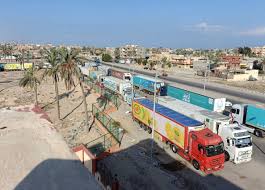Egypt said Friday it has agreed to send U.N. humanitarian aid trucks through Israel’s main crossing into Gaza, but it remained unclear if they will be able to enter the territory as fighting raged in the southern city of Rafah amid Israel’s escalating offensive there. Meanwhile, the bodies of three more hostages killed on Oct. 7 were recovered overnight from Gaza, Israel’s army said Friday. The CIA chief met in Paris with Israeli and Qatari officials, trying to revive negotiations for a cease-fire and a hostage release. Gaza’s humanitarian crisis has spiraled as the U.N. and other aid agencies say the entry of food and other supplies to them has plunged dramatically since Israel’s Rafah offensive began more than two weeks ago. On Friday, the top U.N. court — the International Court of Justice — ordered Israel to halt the Rafah offensive, though Israel is unlikely to comply.
Introduction
Egypt’s Humanitarian Aid Initiative
Egypt’s decision to facilitate the entry of U.N. humanitarian aid trucks through Israel’s main crossing into Gaza marks a significant development in the ongoing conflict. This initiative aims to alleviate the severe humanitarian crisis in Gaza, but its success depends on the volatile situation in Rafah, where intense fighting continues.
The Escalating Conflict in Rafah
Background of the Rafah Offensive
The southern city of Rafah has been at the center of Israel’s recent military operations. The offensive, which began over two weeks ago, has led to significant casualties and widespread destruction, further exacerbating the humanitarian crisis in Gaza.
Impact on Civilians
The continuous fighting has trapped many civilians, making it difficult for aid to reach those in desperate need. The situation has been described as dire by various international organizations, with shortages of food, water, and medical supplies becoming increasingly severe.
Humanitarian Crisis in Gaza
Deteriorating Conditions
The humanitarian situation in Gaza has rapidly deteriorated since the onset of the Rafah offensive. The U.N. and other aid agencies report a dramatic decrease in the entry of essential supplies, worsening the living conditions for the already vulnerable population.
U.N. Aid Efforts
Despite the challenges, the U.N. and other humanitarian organizations continue their efforts to deliver aid. The recent agreement with Egypt is a crucial step towards providing relief, though its implementation remains uncertain due to the ongoing conflict.
The Role of the International Community
U.N. Court’s Ruling
The International Court of Justice has ordered Israel to halt its offensive in Rafah. This ruling underscores the international community’s concern over the humanitarian impact of the conflict. However, compliance with the order remains doubtful given the current circumstances.
Diplomatic Efforts
International diplomatic efforts, including the recent meeting in Paris between the CIA chief, Israeli, and Qatari officials, aim to negotiate a cease-fire and facilitate a hostage release. These talks are crucial in mitigating the conflict and ensuring humanitarian aid can reach those in need.
The Hostage Situation
Recovery of Hostages’ Bodies
The recovery of the bodies of three hostages killed on Oct. 7 highlights the tragic human toll of the conflict. The ongoing efforts to secure the release of remaining hostages are a critical component of the diplomatic negotiations.
Impact on Families
The families of the hostages continue to endure immense suffering. The recovery of the bodies provides some closure, but the uncertainty surrounding the remaining hostages perpetuates their anguish.
Challenges to Humanitarian Aid Delivery
Security Concerns
The primary challenge in delivering humanitarian aid to Gaza is the security situation. The intense fighting in Rafah poses significant risks to aid convoys, making it difficult to ensure safe passage.
Logistical Hurdles
Logistical issues also hinder aid delivery. Coordinating the entry of supplies through conflict zones requires careful planning and negotiation, often resulting in delays and complications.
The Humanitarian Crisis: A Closer Look
Food and Water Shortages
One of the most pressing issues in Gaza is the shortage of food and water. The conflict has disrupted supply lines, leaving many without access to basic necessities.
Medical Supply Deficit
The healthcare system in Gaza is overwhelmed. Hospitals are running out of essential medical supplies, and the influx of injured civilians exacerbates the situation, putting immense strain on medical facilities.
Shelter and Safety
Many civilians have been displaced by the conflict, seeking refuge in overcrowded shelters. The lack of adequate shelter and safety measures increases the vulnerability of these displaced populations.
International Response
Aid from Neighboring Countries
Neighboring countries, including Egypt, have stepped up to provide assistance. Egypt’s agreement to facilitate U.N. aid delivery is a vital part of the regional response to the crisis.
Global Humanitarian Efforts
Global humanitarian organizations are mobilizing resources to support Gaza. These efforts include fundraising, supply donations, and advocacy to raise awareness about the crisis.
The Path Forward
Need for a Cease-Fire
A cease-fire is essential to allow for the safe delivery of humanitarian aid and to provide relief to the affected population. Diplomatic efforts must focus on achieving a lasting cessation of hostilities.
Long-Term Solutions
Beyond immediate relief, there is a need for long-term solutions to address the root causes of the conflict and ensure sustainable peace and stability in the region.
The situation in Gaza remains critical, with the humanitarian crisis deepening amid ongoing conflict in Rafah. Egypt’s agreement to facilitate U.N. aid delivery is a positive step, but significant challenges remain. The international community must continue to push for a cease-fire and support efforts to provide relief to those affected by the crisis. The recovery of hostages’ bodies and ongoing diplomatic negotiations offer some hope, but the path to peace and stability will require sustained effort and cooperation.




